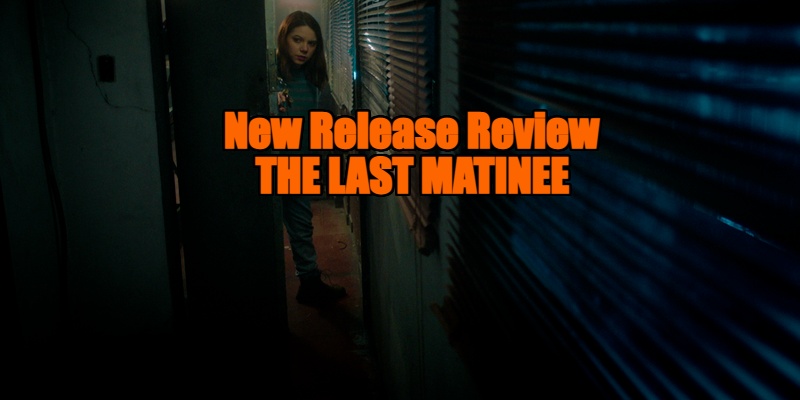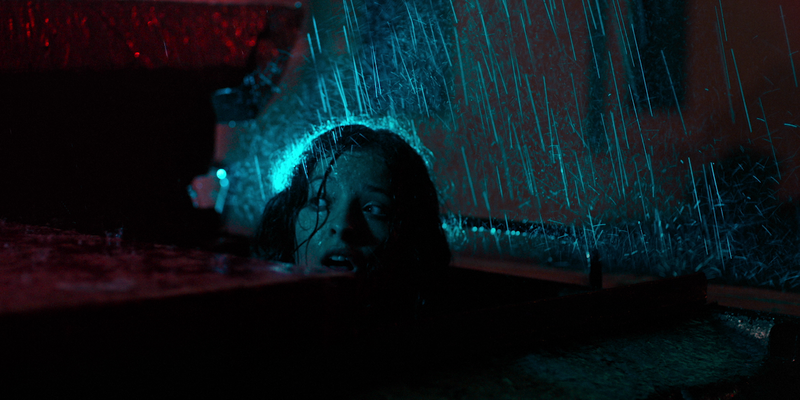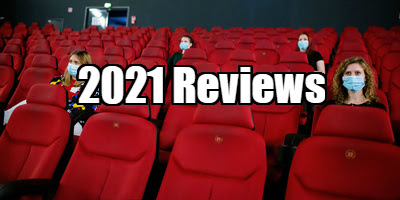
Review by
Eric Hillis
Directed by: Maximiliano Contenti
Starring: Luciana Grasso, Ricardo Islas, Julieta Spinelli, Franco Durán

Cinemas have featured heavily in horror movies down the decades. William
Castle went meta by letting The Tingler loose in a cinema, both on screen
and in the actual real life cinemas showing that movie, with seats rigged up
to deliver electric shocks to patrons. Willard Hyuck's masterpiece Messiah
of Evil utilised a cinema auditorium in a terrifying homage to Hitchcock's
The Birds. Lamberto Bava's Demons sees its tiular baddies run amok in a
German picture palace. Both versions of The Blob have their eponymous monster
attack movie theatres. More recently, indie horrors Porno and Nightmare Cinema have employed a cinema setting.
The movies Uruguayan thriller The Last Matinee apes most heavily are 1991's
Popcorn and Bigas Luna's 1987 thriller Anguish. Like both of those movies,
The Last Matinee sees the patrons and staff of a cinema bumped off by a
psychopath. It even goes so far as to borrow Anguish's killer's modus
operandi of stealing his victim's eyeballs.

Based on its neon drenched aesthetic, director Maximiliano Contenti
would likely prefer to have his film compared with '80s Italian thrillers
like Dario Argento's Inferno and Opera (a poster for the latter displayed
prominently in the lobby of his fictional cinema) and Michele Soavi's Stage Fright. With the aid of his cinematographer Benjamín Silva, Contenti
certainly nails the surface aesthetic of such movies, but in terms of
crafting suspenseful sequences he falls significantly short of the Italian
masters.
Set in 1993, likely for a combination of nostalgia and dispensing with
those pesky cellphones, The Last Matinee defies its title by setting its
action in the evening. Student Ana (Luciana Grasso) relieves her sickly
father from his job at their family run cinema in downtown Montevideo.
Settling into a night of studying in between reel changes, Ana is initially
unaware that her customers are being butchered by a maniac in a hooded
raincoat, who removes his victim's eyes and keeps them in a jar, later
chomping on them like pickles.

The patrons/victims are a generic bunch. There's an old homeless duffer, a
couple on what seems like an awkward first date, and a trio of teens. We
spend a considerable amount of time in their presence, with close to an hour
passing before the action finally ramps up, but the movie never does enough
to make us care about any of them before they get massacred.
The same can be said for the villain, who has no defining features or
backstory. We don't get so much as a news bulletin warning of an escaped
maniac. He seems to have no motivations beyond his hunger for a crunchy
eyeball.

Save for a clever moment in which a victim is bludgeoned in a projector as their blood stains the cinema screen red, Contenti stages his kills in uninspired fashion, and the
editing is often confusing. The director also struggles to make the most of
his limited location. A cinema auditorium is essentially a big open space,
so it's baffling how nobody is noticing the killer at work. Contenti's failure to
establish the geography of the setting means that when the finale kicks in
we're never sure of where the killer is in relation to his potential
victims, erasing much of the potential tension and suspense. The soundtrack
- a selection of synthwave tracks - is clunkily deployed, with music just
dropped over scenes with no real attention to how it might compliment the
editing.
The Last Matinee is clearly a love letter to horror movies of the past, but
it's penned with an unsteady hand. Ironically, the film within the film -
which appears to pay homage to the Spanish horrors of cult filmmakers like
Jess Franco and Paul Naschy - seems more well crafted than the stylish but
unconvincing nod to Italian horror that plays host to it.


